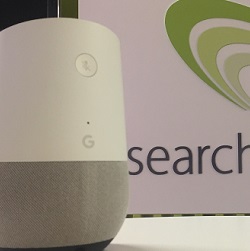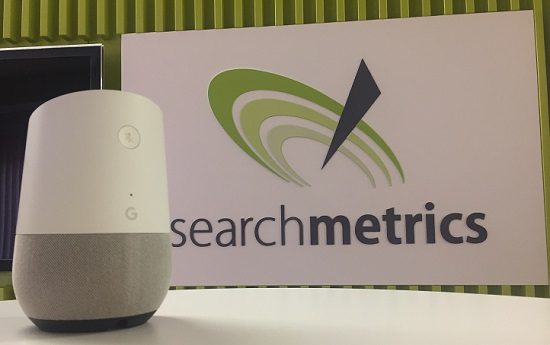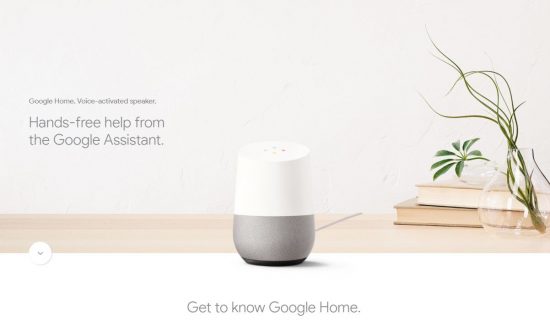Google Home, the voice-powered smart speaker that lets users ask the Google Assistant questions, has been on the US market since November 2016. With the device now becoming available internationally, we took the opportunity to ask a number of experts about their experience with Google Home so far, and what it could mean for the future of voice search.
To mark the international rollout of Google Home, we asked the experts for their opinions on how it will affect search behavior, results, rankings and performance. In particular, how does it differ from or compare to other smart speakers or voice-powered assistant systems, like Amazon Echo, which was launched last year a couple of months before Google Home, and Apple’s HomePod, which is set to enter the fray in December 2017?
In addition to gathering expert views, we recently carried out some of our own tests with Google Home, looking at the opportunities and challenges that the smart speaker wars are starting to throw at marketers.
The Google Home device is currently available from the Google Store for $109.00.
This page also provides an overview of the device’s features and further information.
“OK Google – What does the future hold?”
In our survey, we asked the following questions:
- From “Desktop first” via “Mobile first” to “Voice first”? How important is Voice Search for the development of Google and online search in general?
- Gadget or smart search? Do you have any experiences with smart speaker search results?
- Google Home is now internationally available. Are you an early adopter or still skeptical?
Below you can read the experts’ answers.
Industry experts’ opinions on Voice Search and Google Home
Barry Schwartz
Founder, Search Engine Roundtable
 Voice Search is one of those really exciting areas right now; it does remind me of the earlier days of mobile search. Now with mobile search accounting for more than desktop search, it will be fun and exciting to watch the progression of how voice search grows. Voice Search adds to the importance for SEOs of focusing on position zero. Keep an eye on this ever-changing landscape.
Voice Search is one of those really exciting areas right now; it does remind me of the earlier days of mobile search. Now with mobile search accounting for more than desktop search, it will be fun and exciting to watch the progression of how voice search grows. Voice Search adds to the importance for SEOs of focusing on position zero. Keep an eye on this ever-changing landscape.
Lukasz Zelezny
SEO Keynote Speaker and Social Media Consultant
 For the younger generation, born post-2000, this definitely could be a useful thing. For me personally, I rarely use Voice Search. Instead, I do sometimes use text-to-speech when I am in a hurry. But in general I’m not really a fan of searching with my voice.
For the younger generation, born post-2000, this definitely could be a useful thing. For me personally, I rarely use Voice Search. Instead, I do sometimes use text-to-speech when I am in a hurry. But in general I’m not really a fan of searching with my voice.
I did have (Amazon’s) Alexa and I played with it a few times asking, “Hey Alexa, do you have a boyfriend?” or “Play me a Christmas song.” Other than that, I didn’t find it very useful for anything other than gimmicky searches. In the end, I stopped using it and turned it off, as I had this feeling it was constantly listening and spying on my every word. On the whole, I’m definitely on the side of the Voice Search skeptics, as it’s something I simply don’t need. Just like I didn’t need Google Glass.
Bartosz Góralewicz
Co-founder and CEO, Goralewicz SEO Agency
 We need to distinguish between Mobile, Desktop and Voice as each playing a different role in search. Each has its specific pros and cons. It is important to differentiate between why and when people use one of those three (or a mix). My observation is that people use voice differently, depending on the country they come from or their age. In my opinion, Voice Search is already important, but there is not yet enough data to shed more light on the specifics of this fairly new search channel.
We need to distinguish between Mobile, Desktop and Voice as each playing a different role in search. Each has its specific pros and cons. It is important to differentiate between why and when people use one of those three (or a mix). My observation is that people use voice differently, depending on the country they come from or their age. In my opinion, Voice Search is already important, but there is not yet enough data to shed more light on the specifics of this fairly new search channel.
Right now, Google Home can definitely be considered a gadget but, when playing with it, I was surprised by how good it is and that it is actually fully functional. And whilst I don’t personally own a Google Home device and I am not planning on buying one anytime soon (especially because I have a mobile phone capable of doing the same), I do often use Voice Search or Google Assistant on my mobile.
Each time I hear Google’s reply to my question, I gain more respect for how much Google has invested in this field. I believe Voice Search will grow and become more important, but for now I am focused on watching how it develops, and I am far from being hyped about Voice Search becoming a real game-changer anytime soon.
Jordan Koene
Chief Evangelist, Searchmetrics
 I’ve spent some time testing Google Home and Amazon’s Echo devices. While it’s still early days for smart speakers with Voice Search included, every marketer should be paying attention to this category. What’s happening is that Voice Search is moving out of a niche category into something bigger and broader.
I’ve spent some time testing Google Home and Amazon’s Echo devices. While it’s still early days for smart speakers with Voice Search included, every marketer should be paying attention to this category. What’s happening is that Voice Search is moving out of a niche category into something bigger and broader.
Sure, it will take time – I’d say at least five years before these are used more for search than simply playing music. But all the big players – whether it’s Apple, Google, Amazon or others – are signaling they’re committed to Voice Search as a category. You can also see from their investments in artificial intelligence that search is morphing in natural-language processing, which will force marketers to up their game and become hyper-local and hyper-specific about meeting online users’ needs.
That said, none of these things are mutually exclusive. Desktop, mobile, smart speakers and probably a half dozen other things we haven’t yet considered are going to be must-have parts of a marketer’s strategy. That means people will need capable platforms for developing content and staff to create and refresh the many different types of content categories.
Jason Barnard
Freelance Search Marketing Consultant
 Long term, “Voice first” will be a game-changer. More so than “Mobile first.” However, it is important not to get carried away in the short term. Like Mobile, it will not be a seismic shift from one day to the next. “Voice first” will evolve over the coming years, and that gives us time to adapt our strategies. NB: I use the word “strategy” with great emphasis. SEO has traditionally been about “tactics.“ Black hat is an extreme example of this (not my bag).
Long term, “Voice first” will be a game-changer. More so than “Mobile first.” However, it is important not to get carried away in the short term. Like Mobile, it will not be a seismic shift from one day to the next. “Voice first” will evolve over the coming years, and that gives us time to adapt our strategies. NB: I use the word “strategy” with great emphasis. SEO has traditionally been about “tactics.“ Black hat is an extreme example of this (not my bag).
Simplistic tactics (white and black hat) are dying, and will soon be dead. A few links here or there, or a nice meta title, or some lovely titles in a page, a bit of social media activity will no longer carry anyone to the top on their own.
“Voice first” necessarily depends on deep learning by the machines and deep-seated strategies by solution providers (you). The overriding aspects any online marketer needs to get right are: Context and Credibility. Two small words that are simple to say, but VERY, VERY difficult to build. A few relevant links, an attractive meta title, and relevant titles in a page are the minimum requirement. Building context and credibility for the brand is what will carry you over the line ahead of your competitors.
All that said, cries of “SEO is dead” are premature. Position zero will become increasingly important. “Voice first” is the future, but we are still in the present. Work only on the future, and the present will pass you by 🙂 My advice is: Your short-term bottom line requires that you continue with your (intelligent) SEO strategies today.
Medium-term, you need to be:
- 100% mobile friendly
- providing quality, structured information (Schema.org/HTML5) to Google and Bing.
Long-term you will need to be:
- natively talking the talk in the language these machines can digest easily (Schema.org/HTML5)
- providing context for your brand and products
- building the credibility of your brand in the eyes of these “intelligent machines” and prove that your brand is the “best in market” for the respective type and context of queries
In short, “Desktop first” / “Mobile first” / “Voice first” are not mutually exclusive. “Voice first” is a big part of the future, but will co-exist with desktop and mobile.
Jo Turnbull
Search London Organizer and SEO Blogger
 Voice Search will be very important for the development of online search because it reaches out to those who maybe do not have a desktop computer or those unable to use a mobile in the traditional way. For example, those unable to type on their keyboards (mobile and desktop). These people still want to use search and navigate themselves through the online world. Voice Search gives them the means to be able to connect with others in the same way that desktop and mobile have. It will be interesting to see how Voice Search develops as it cannot always make out words/sentences from those with stronger accents.
Voice Search will be very important for the development of online search because it reaches out to those who maybe do not have a desktop computer or those unable to use a mobile in the traditional way. For example, those unable to type on their keyboards (mobile and desktop). These people still want to use search and navigate themselves through the online world. Voice Search gives them the means to be able to connect with others in the same way that desktop and mobile have. It will be interesting to see how Voice Search develops as it cannot always make out words/sentences from those with stronger accents.
Whilst I have not personally used Voice Search much yet, I will be starting to experiment more now. So far, I have been a little skeptical, but I love the concept of voice-powered devices. I would ideally like for Google Assistant to be able to clean my house, cook me dinner and maybe even say “Welcome home” after a long, hard day at the office. Maybe in the future it might do that, but give it a few more years.
Joshua Panter
SEO Specialist, atom42
 Voice Search is on the rise, but there’s still a barrier to entry in terms of its use outside of the home or where people feel comfortable talking to their devices in public. There’s added convenience with Voice Search as long as it works correctly, and there’s likely to be an increase in the number of searches happening via Voice Search, in part thanks to the conversational nature of the returned results.
Voice Search is on the rise, but there’s still a barrier to entry in terms of its use outside of the home or where people feel comfortable talking to their devices in public. There’s added convenience with Voice Search as long as it works correctly, and there’s likely to be an increase in the number of searches happening via Voice Search, in part thanks to the conversational nature of the returned results.
In terms of its importance, I think Google will be seeing it as an opportunity to be present during even more stages of a user’s journey. As adoption becomes more prevalent, it’ll create an almost seamless relationship between users and Google, giving them more data, and more insight into search behavior and what users want.
I’m already an avid user of the Google Assistant on my phone, and I use it for reminders, timers, information etc. but I haven’t yet purchased Google Home. I’d say that puts me somewhere between skeptic and early adopter. I think the Google Assistant is very useful, but I’m not as sold on a static device in one room, particularly as I already have a mobile device that does much the same.
Twitter Poll: How important is Voice Search going to be for SEO?
For this post, we also conducted a small Twitter poll on the topic of voice search. Thank you to everyone who took part. Here’s the result of the vote:
With #GoogleHome there’s a new player among the #SmartSpeakers. How important will #VoiceSearch be for #SEO in future? #Alexa #Siri #Cortana
— Searchmetrics (@Searchmetrics) August 9, 2017


